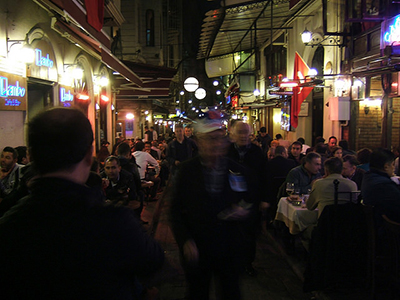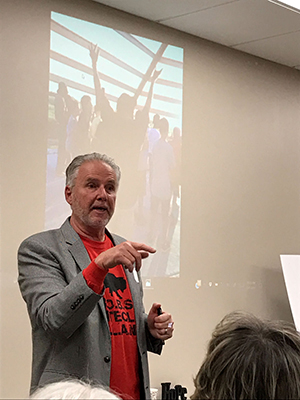Blog
Put California’s 4 a.m. Bar Bill to Bed
- Details
- Created: Monday, February 27 2017 19:19
 Most doctors will tell you it’s never too early to stop drinking. According to California State Senator Scott Wiener (D-San Francisco), however, it’s never too late to keep drinking. Wiener has introduced a bill to the state senate allowing bars and nightclubs to continue serving alcohol until 4 a.m. Wiener claims the bill (SB 384) will promote tourism and generate additional income. However, existing research suggests the extra costs—in law enforcement, health and safety, and quality of life—will far outweigh any tax revenues.
Most doctors will tell you it’s never too early to stop drinking. According to California State Senator Scott Wiener (D-San Francisco), however, it’s never too late to keep drinking. Wiener has introduced a bill to the state senate allowing bars and nightclubs to continue serving alcohol until 4 a.m. Wiener claims the bill (SB 384) will promote tourism and generate additional income. However, existing research suggests the extra costs—in law enforcement, health and safety, and quality of life—will far outweigh any tax revenues.
Health research and common sense both suggest that later alcohol service is linked to greater alcohol-related violence, traffic incidents, and emergency room visits. This both costs money and strains emergency services, forcing both law enforcement and medical staffs to operate at higher capacities around the clock. Proponents of the bill contend the bill emphasizes “local control,” but residents of alcohol-outlet dense neighborhood will be disproportionately impacted while any revenue benefits flow up into state coffers or into the pockets of the nightlife industry. Moreover, none of those profits are earmarked for programs to counteract the harm caused by extended drinking. This gap is exacerbated by a law passed by voters in 2010 that makes it effectively impossible for local jurisdictions to generate those funds through charge-for-harm strategies—a bit of bitter irony that local control advocates conveniently ignore.
This is the second go-around for a late-night bar bill. A similar version of was introduced in 2013 by Mark Leno, and defeated thanks to the efforts of community groups and health advocates. “Nothing has changed since 2013,” said Bruce Lee Livingston, Executive Director / CEO of Alcohol Justice. “A bill to allow the sale of alcohol until 4 a.m. will create dangerous new public policy that threatens health and safety throughout California.”
California already bears a higher burden from alcohol-related harm than any other state, including 10,572 dates, 17,700 hospitalizations, and tens of billions of dollars of costs to government and the public. Moreover, researchers are only scratching the surface of the long-term health effects of alcohol. “We just don’t need additional hours of business for this substance,” Alcohol Justice Director of Public Affairs Michael Scippa told the San Francisco Chronicle. “It’s not like selling coffee and doughnuts. This is a substance which is a class one carcinogen.”
Extended bar hours have a proven potential to create lasting damage to individuals and communities, and offer few benefits to average Californians. Alcohol Justice and the California Alcohol Policy Alliance strongly oppose SB 384. Put this dangerous bill to bed.
READ MORE about Alcohol Justice and CAPA’s opposition.
LISTEN to Alcohol Justice Executive Director/CEO Bruce Lee Livingston present his opposition on KQED.
WATCH CAPA's video giving the truth on this unsafe, unhealthy bill.
TAKE ACTION to urge your elected representatives to stop SB 384.
Hearing Date Moved; Buying Out the Bad Guys - 2/27/17
- Details
- Created: Monday, February 27 2017 19:41
Hearing Date Moved; Buying Out the Bad Guys

Street minister Bruce BonFleur doesn’t just forgive those who trespass against him. In a bold quest to undo the damage they cause, he hopes to hand them millions of dollars. BonFleur heads up Lakota Hope, a ministry that caters to those impacted by alcohol sales in Whiteclay, a 12-person Nebraska enclave that nonetheless moves over 3 million cans of beer per year from four liquor stores. These sales predominantly involve residents of the Pine Ridge Indian Reservation, a legally dry jurisdiction which nonetheless suffers from crippling rates of alcoholism and alcohol-related harms.
BonFleur told the Omaha World-Herald that he plans to raise $6.3 million to purchase the town’s four liquor stores. State legislators have recently asked the liquor stores to reapply for their licenses, giving the state time to review the law enforcement strain created by the tiny town’s massive alcohol trade. This has created uncertainty among the store owners, which in turn allows a rare opportunity for BonFleur and allies to buy out and close up the stores once and for all.
First, of course, he needs the money. He has launched the nonprofit Whiteclay Redevelopment L3C to raise funds and share the Whiteclay story.
As for the store licenses themselves, the state rescheduled the hearings from March 7th to April 6th. The rescheduling follows a challenge to the Sheridan County (wherein Whiteclay is located) commissioners’ recommendation that the liquor licenses be renewed. If BonFleur is unsuccessful, state liquor board intervention remains the last, best hope to end Whiteclay’s ongoing public health disaster.
TAKE ACTION to tell the Nebraska legislature to save lives and shut down the Whiteclay liquor stores.
States Move to Tighten DUI Laws
- Details
- Created: Monday, February 27 2017 19:48
 There is no safe level of drinking before driving. While 0.08 is the threshold throughout the U.S., this number isn’t a proven cutoff. Many countries throughout the world set the cutoff lower, and this year four states are considering meeting them there.
There is no safe level of drinking before driving. While 0.08 is the threshold throughout the U.S., this number isn’t a proven cutoff. Many countries throughout the world set the cutoff lower, and this year four states are considering meeting them there. The National Transit Safety Board has long advocated to set a 0.05 blood alcohol content as the base level for driving under the influence. Hawaii, Utah, and Washington all have bills in their legislature setting the BAC limits there, while a New York bill would set it at 0.06. The Hawaiian bill was introduced by State Senator Josh Green, a physician. “At 0.05, you’re 50 percent less likely to cause an accident, less likely to hurt yourself, to kill an innocent person on the road,” Dr. Green said to local outlet KHON.
Alcohol Justice has long maintained that 0.05 saves lives. “Alcohol is a factor in almost a third of motor vehicle fatalities in this country,” said Michael Scippa, Director of Public Affairs for Alcohol Justice. “When it comes to lowering BAC limits and saving lives, the science is on the side of these legislators.”
TAKE ACTION to tell your representatives to support Point .05 Saves Lives.
More Articles ...
Subcategories
Help us hold Big Alcohol accountable for the harm its products cause.
| GET ACTION ALERTS AND eNEWS |
STAY CONNECTED    |
CONTACT US 24 Belvedere St. San Rafael, CA 94901 415-456-5692 |
SUPPORT US Terms of Service & Privacy Policy |


